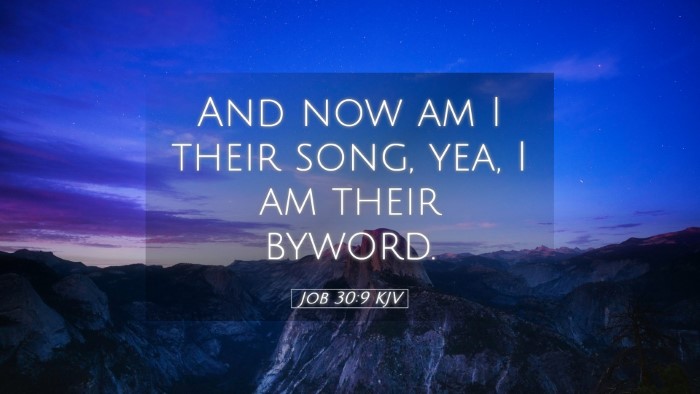Commentary on Job 30:9
Verse (Job 30:9): "And now I am their song, yea, I am their byword."
Introduction
The Book of Job is a profound exploration of suffering, faith, and divine justice. In Job 30:9, we see the culmination of Job's lament as he contrasts his earlier exaltation with his current state of despair. In this commentary, we will explore various insights from esteemed public domain commentaries to develop a deeper understanding of this poignant verse.
Contextual Analysis
Job 30 is situated within a discourse where Job articulates his deep suffering and the scorn he faces from society. The preceding chapters depict Job in a state of great distress, moving from a position of honor to one of ridicule. His friends, who once revered him, now become his adversaries, mocking not only his condition but also his piety. This backdrop is critical to understanding Job’s emotional state as reflected in 30:9.
Matthew Henry's Insights
Matthew Henry reflects on the profound irony in Job's situation. Once a figure of honor, Job is now reduced to a "song" and "byword." This suggests that his very life serves as a cautionary tale, whereby others use his name in jest or derision. Henry emphasizes the transition from respect to reproach. He notes that Job, through the rise of his trials, becomes a reflection of the vulnerability of human existence. Such reflections provide a lens through which the faithful can grapple with their own experiences of suffering and societal ostracism.
Albert Barnes' Commentary
Albert Barnes elaborates on the depth of humiliation expressed in this verse. He proposes that to be made a "song" denotes the utter degradation Job has experienced. Songs, he argues, often convey cultural narratives; thus, Job becomes a narrative of caution rather than virtue. Barnes points out that this reflects a broader theological truth: the pious are sometimes subjected to the scorn of the wicked, pointing readers toward the burdens of righteousness in a fallen world. He encourages readers to find solace in the understanding that such scorn is ephemeral and does not reflect one's true spiritual state.
Adam Clarke's Exegesis
Adam Clarke's commentary expands on the nature of the disgrace that Job endures. He articulates that Job's name has become synonymous with misfortune among the common people. Clarke indicates that being a "byword" suggests a loss of identity and dignity, where Job's once esteemed reputation has been utterly shattered. Clarke considers this a harsh reality of mortality and the unpredictability of life, indicating that even the most righteous may encounter the bitter realities of existence.
Theological Reflections
As we reflect on Job 30:9, several theological themes emerge:
- The Problem of Suffering: The verse encapsulates the essence of theodicy, where Job’s suffering prompts questions about God’s justice and the well-being of the righteous.
- The Reality of Reproach: Job’s situation reminds the faithful that believers may encounter scorn and ridicule, challenging the assumption that righteousness always leads to societal approval.
- The Paradox of Honor and Dishonor: Job’s transformation from honored individual to object of mockery points to the transient nature of human status and the lasting value of divine approval over worldly opinion.
Application for Faith Leaders and Scholars
This verse serves as a reminder for pastors and theologians of the complexities surrounding human suffering and divine sovereignty. When preaching or teaching, it is crucial to address the emotional and spiritual anguish that congregants may experience when faced with ridicule or affliction. Encouraging reflections on the life of Job can help foster a deeper compassion for those who suffer, inviting communities to engage with these themes actively.
Conclusion
Job 30:9 stands as a powerful testament to the struggles inherent in the human condition. Through the insights of Matthew Henry, Albert Barnes, and Adam Clarke, we appreciate not just Job’s individual plight but the broader theological implications regarding suffering and faith. This commentary aims to resonate not only with scholars but also with those seeking understanding in the face of their trials, encouraging all to hold fast to their faith in a God who sees and understands our deepest agonies.


